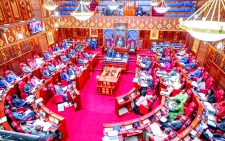Spies to pry on accounts, phones in new graft plan

The National Intelligence Service (NIS) could soon be legally mandated to pry into individual accounts, assets and private lives of public officers as part of the government’s latest strategy to upscale the fight against corruption.
Should recommendations by the National Crime Research Centre (NCRC) on how to improve the fight against corruption be implemented fully, the traditionally secretive spy agency would play an active role in the battle to stop theft of public resources.
The survey, sanctioned by President Uhuru Kenyatta, has recommended that NIS partners with the Ethics and Anti-Corruption Commission (EACC), Directorate of Criminal Investigations (DCI) and other players involved in the graft war.
The report, which was officially launched by Interior Cabinet Secretary in March, faults the Directorate of Public Prosecutions (DPP), EACC, Anti-Corruption Courts (ACC) and the Judiciary as the weak links in the fight against corruption.
“Most of the public officials thought that the State organs had achieved some marginal level of success and hence rated the organs as successful.
But the least performing organs were rated as being EACC, followed by Judiciary, ACC and the ODPP,” the report observes.
It further recommends that all the agencies involved in the fight against graft should give priority to disruption of professional enablers of corruption by conducting regular vetting and impromptu internal and external monetary surveillance of uncounted for wealth accumulation and lifestyle audits.
Intelligence sharing
The disciplined civilian service has been playing a critical role in identifying people stealing public assets, albeit covertly.
The service has seven divisions, with the internal intelligence directorate tasked mainly with gathering domestic intelligence.
In the survey titled “A study on perception and experiences of corruption in the public service in Kenya”, NCRC has also proposed that the Central Bank of Kenya (CBK) which regulates banks, Kenya Bankers Association (KBA), Kenya Institute of Bankers and Kenya Revenue Authority (KRA), the Office of the Auditor General, which tracks government expenditure, and the Registrar of Companies to work closely in taming corruption and take action against perpetrators.
“Concerted efforts of the EACC, DCI, NIS, DPP office and Auditor General’s office are needed with regard to intelligence sharing on corruption, multi-layered oversight of public service institutional financial transactions and innovative identification, detection, investigation and free-from influence prosecution mechanism,” reads the report.
The report notes that graft was still rampant in the national and county governments offices. Some of the reasons cited for this despite enactment of anti-corruption laws and creation of institutions include weak and compromised legal framework, culture of impunity, lack of commitment by the government to fight graft and corrupt leadership.
The top four unsatisfactory service delivery values reported by the public and public officials were said to be honesty and trust; transparency and accountability; prompt service delivery and impartiality.
“County specific analysis on rating of selected service delivery values showed that all the eight values were rated unsatisfactorily by more than 50 per cent of the members of the public in at least 39 of the 47 counties,” the report states.
Corruption proceeds
NIS has been covertly taking part in the anti-graft war, mostly through the Financial Report Centre (FRC), which assists in identifying proceeds of crime and combating money laundering, and it shares intelligence with the Assets Recovery Agency (ARA), which has been instrumental in freezing and recovering corruption proceeds from suspects.
The Twalib Mbarak-led EACC, the report says, should partner with NIS, DCI, banks, KRA and the Registrar of Companies to sanitise records of companies doing business with the government.
The commission is also expected to undertake identification, profiling, audit and trailing of wealth accumulation, investigate business portfolios and lifestyles of non-public officials, who perpetrate corruption.
EACC and DCI detectives have recently reported a surge in fraud and corrupt transactions perpetrated by well-connected individuals owning phoney companies and shell corporations.












